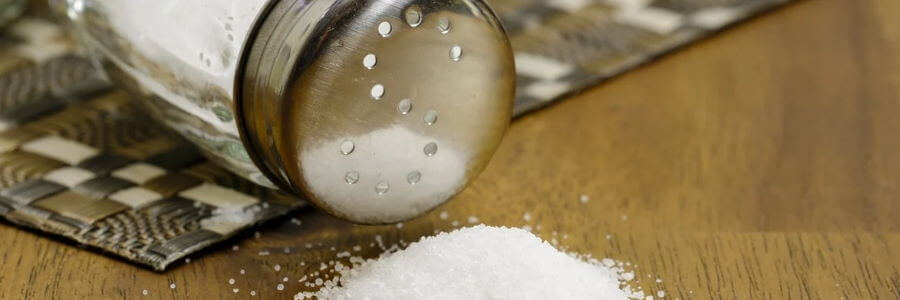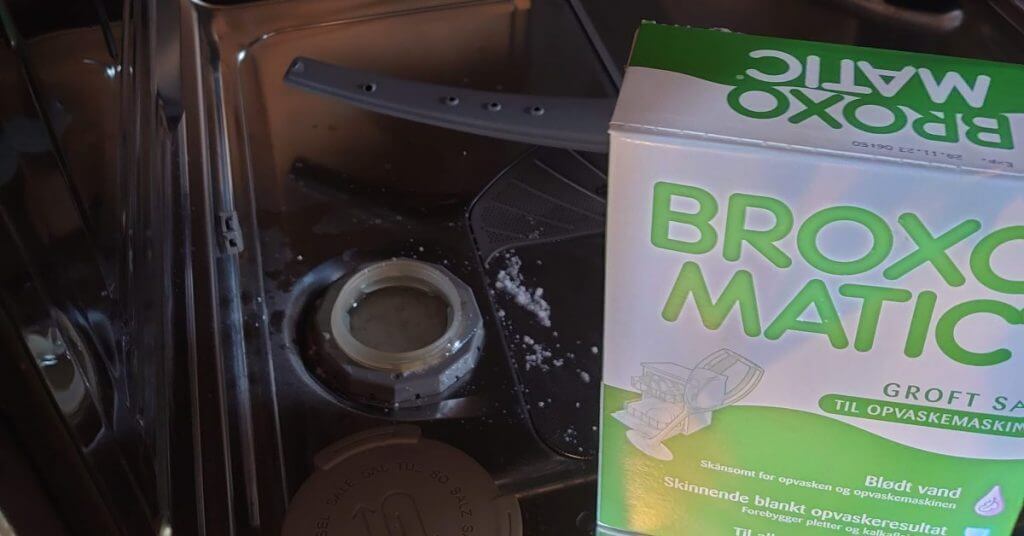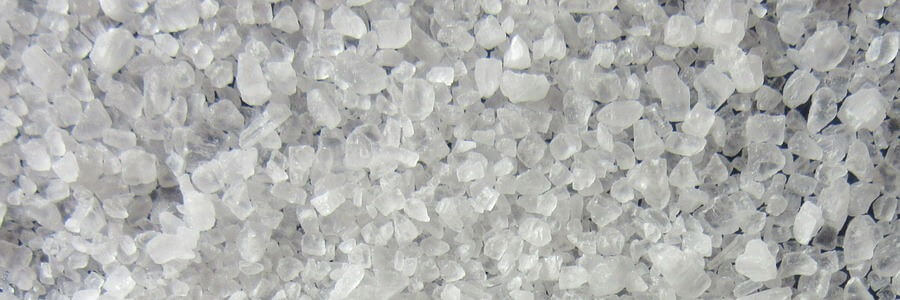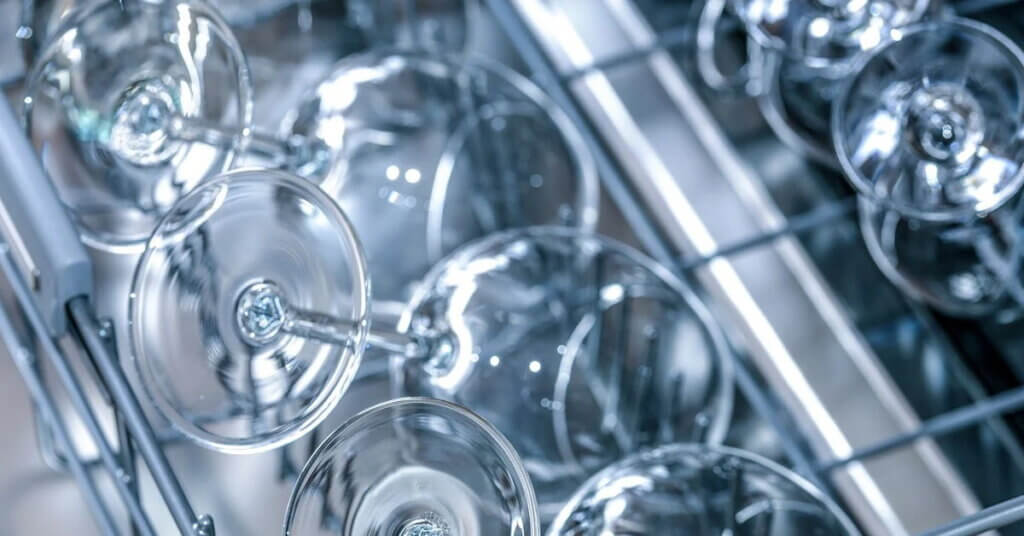Dishwasher salt is made for regenerating the water softener, consisting of ion exchange resins, that exist in both household and industrial dishwashers. Dishwasher salt is a particular grade of granulated pure crystalline sodium chloride with salt crystals larger than those of table salt. The granule size ensures that the salt dissolves slowly reducing the risk of blocking the softener unit.
The salt is used to regenerate and expel the calcium and magnesium ions that are trapped in the built-in water softener. The important thing is to have soft water in dishwashers as else scale will form both inside and on the tableware/glasses.

Is dishwasher salt the same as table salt? The Difference
Dishwasher salt, granulated sodium chloride, and table salt consist of the same chemical molecules, sodium, and chloride. On a chemical level, they are therefore the same, still, there are some differences and reasons why you never should use table salt inside the dishwasher.
First is the size, dishwasher salt has a larger granule size compared to table salt. Table salt granules are ground to a smaller and finer consistency than dishwasher salts, the smaller size can result in clogged drains when used inside a dishwasher.
Another major difference between dishwasher salt and table salt is that dishwasher salt is made of 100% sodium chloride. Table salt on the other hand is made with additives and often contains anti-caking compounds like magnesium.
The resin in the softener is made to catch magnesium from the hard water and would therefore already be used up by the magnesium additives in the table salt. The result will be reduced efficiency of the softener with scaling and water stains on your dishes.
How Dishwasher Salt Works
A dishwasher with an internal softener unit filled with ion exchange resin balls uses negatively charged resin balls to attract and absorb calcium and magnesium ions from the water. Removing the ions from hard water is the key to reducing the risk of limescale that creates stains on the glassware or negatively affects the dishwasher.

The resin balls are then washed with a highly concentrated salt brine consisting of dishwasher salt, sodium chloride, and water. The resin balls attract the sodium ions because of the high concentration of ions; releasing the calcium and magnesium into the water and thus resetting the balls. The magnesium and calcium ions are flushed away to drain the system and the system is now ready for a new dishing cycle.
During the dishing cycle, the calcium and magnesium ions are more prone to react to the resin balls. The resin will release the bounded sodium ion and absorb the free calcium/magnesium ion in the water in a process known as ion exchange. Shifting the composition of the water makes it impossible for limescale to form.
Is Dishwasher Salt Poisonous?
Dishwasher salt is no more poisonous than normal table salt. That being said you shall not eat pure salt and less than a tablespoon of salt may severely poison an infant and sometimes prove fatal.
The salt will impact the ion balance inside the body and therefore it’s important to drink plenty of water if you have eaten a lot of pure salt. It’s recommended to seek immediate medical attention if you are starting to feel ill.
Dishwasher salt is not considered food grade and therefore may contain toxic elements that are not tested and the salt may not be purified.

Sea Salt In the Dishwasher?
Compared to table salt which has additives sea salt is 100% composed of natural sea salt. Thanks to its high purity, it does not contain additives that can spoil your dishwashers such as anti-caking agents or other substances.
Sea salt can therefore be used, the reason why you should is that it’s not an economical alternative in the long run compared the dishwasher salt.
Can you use rock salt in a dishwasher?
You can use rock salt in the dishwasher as long as it has large granulates and does not contain any anti-caking agent it’s safe to use in the dishwasher. Dishwasher salt is 100% pure sodium chloride with much larger granules than normal rock salt. The large granulates help the regenerating brine system to make sure that when the salt gets wet, it doesn’t become a solid mass or block the softener unit.
Dishwasher Salt Alternatives
While dishwasher salt is specifically designed for regenerating water softeners in dishwashers, there may be situations where alternatives are sought. It’s important to note that using substitutes may not yield the same optimal results as dedicated dishwasher salt. Here are a two alternatives that are sometimes considered:
- Sea Salt:
- Composition: Sea salt is composed of natural sea minerals without additives.
- Considerations: While sea salt is additive-free, it may not be as economically viable as dishwasher salt in the long run. Additionally, its granule size might vary, and it may not provide the precise characteristics needed for effective water softener regeneration.
- Rock Salt:
- Considerations: Rock salt can be a viable alternative if it has large granules and does not contain anti-caking agents. However, it’s essential to ensure that the granule size is suitable to prevent blockages in the softener unit. Dishwasher salt is still generally preferred for its purity and specific design for water softening.
Dont use
- Table Salt:
- Composition: Table salt contains sodium and chloride molecules with potential additives like anti-caking agents.
- Considerations: While table salt shares the same chemical composition as dishwasher salt, its smaller granule size can lead to drainage issues in the dishwasher. Moreover, additives in table salt may interfere with the ion exchange resin, reducing the efficiency of water softener regeneration.
It’s crucial to exercise caution when considering alternatives, as the wrong choice may compromise the efficiency of the dishwasher’s water softening system or worse case destroy the machine. Dishwasher salt is formulated to meet the specific needs of the appliance, and deviations may result in limescale buildup, reduced performance, and potential damage to the dishwasher.
What does dishwasher salt do and why do dishwashers need it?
The are a couple of different reasons why the dishwasher doesn’t work well with hard water. You can read more about why the dishwasher needs salt here.
In short, dishwasher detergent works best in soft water, hard water can cause glasses to become cloudy over time and the machine is risking stopping working because of limescale buildup.
Dishwasher salt is the key to regenerating the ion exchange resin unit inside the dishwasher.


